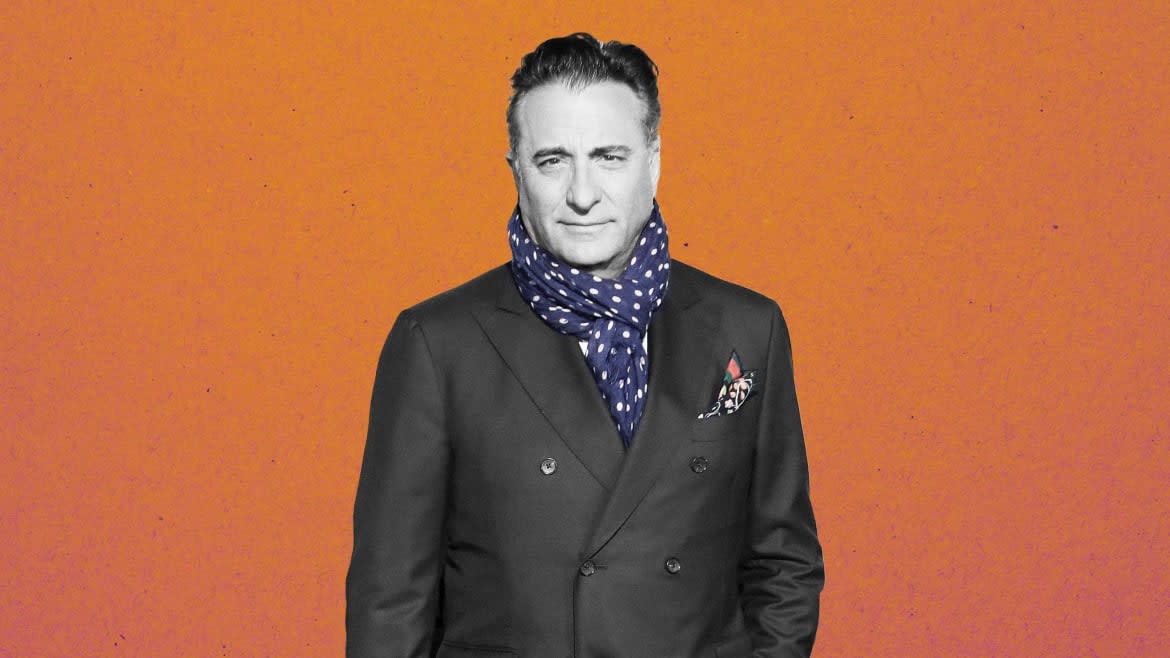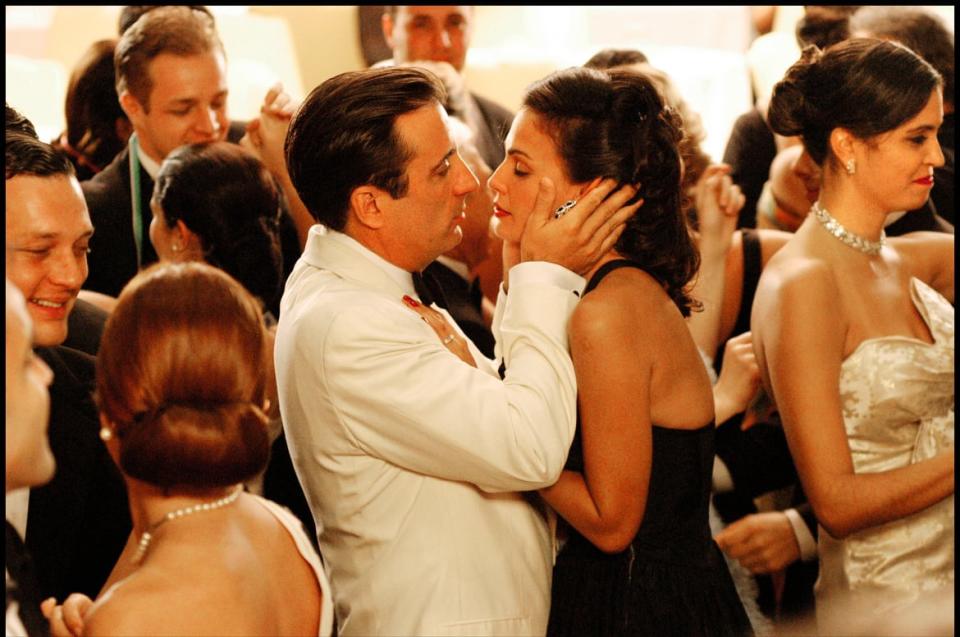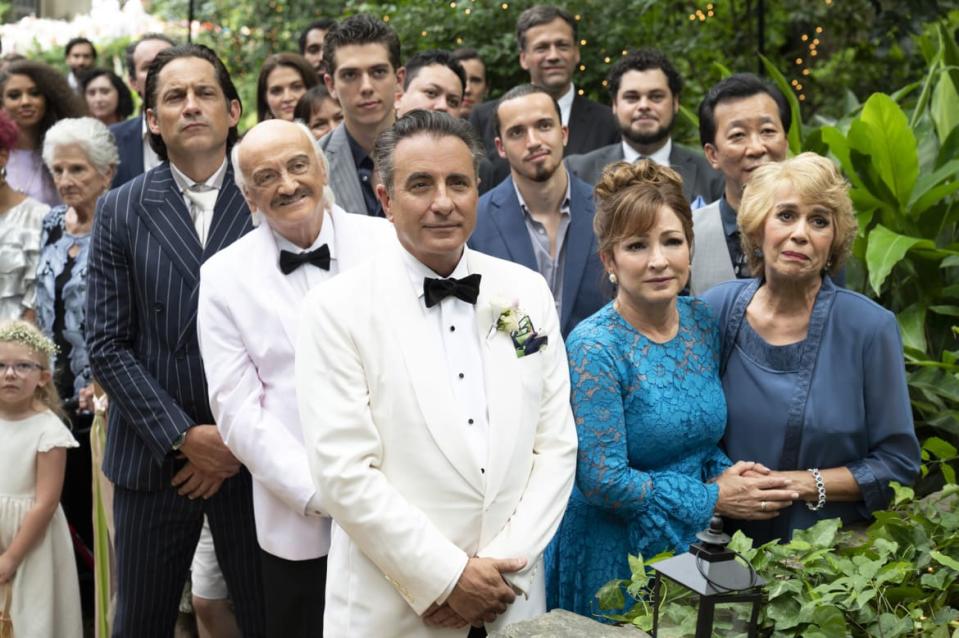After Years of Being ‘Typecast,’ Andy García Is Getting His Second Act

- Oops!Something went wrong.Please try again later.
- Oops!Something went wrong.Please try again later.
- Oops!Something went wrong.Please try again later.
Andy García looks like he’s ready for an Architectural Digest photoshoot. Seated in his studio for our Zoom interview, the actor tells me in that distinct and distinguished murmur, “This is where I live.” Sunlight bounces around the room, illuminating an appealingly cluttered menagerie—a stack of books on the coffee table here, four conga drums there… and two Panama hats side by side on the back of a tan leather couch.
As a devout maximalist, I’m enchanted—and perhaps reminded of my late abuelo’s office, which also pulled off a certain organized-but-chock-a-block je ne sais quoi. When complimented on his decorating, however, García affably corrects me: This is not décor, he says, but “things thrown around.”
“It’s engulfing me,” he adds with a touch of levity. “I need some spring cleaning in the fall!”
As National Hispanic Heritage Month came to a close, García spoke with The Daily Beast about his long career in Hollywood, the state of Latinx representation in film, and the challenges he faced while making his passion project The Lost City—a love letter to the Cuba his family left behind in 1961. The 66-year-old actor has been known over the decades to be a private person, but he does not mince words about how the industry has historically treated anyone with a Latin surname—or the joy he’s nonetheless gleaned over the years from working with heavy-hitters like Francis Ford Coppola, Brian de Palma, Ridley Scott, Diane Keaton, and Meryl Streep.
“I think people get tired and spit you out if you’re in the public eye too much,” he said. “I think it’s important to have some sort of a privacy or enigma so people can accept you as a character and not see you as who you are in real life.”
How Warner Bros. Discovery Is Screwing Over Latinos
When a young García first arrived in Los Angeles in 1978, flush with cash from a summer job at a disco club, he had only one friend in the city: fellow Cuban American actor Steven Bauer, who enjoyed early-career success in Scarface and urged García to make the move. “When I got here, I didn’t get the same kind of reception,” García said. “It took a very long time.” It was seven years, to be exact, before he landed his career-boosting role in the 1985 thriller The Mean Season.
At that time, the media landscape included only a handful of studios, a few broadcast TV networks, and PBS—so opportunities were scarce, especially for actors who fell outside Hollywood’s conventional box. In a 1991 Sun Sentinel interview, García recalled a comment he once received from an agent: “Fix your teeth, change your hair, and lose your accent and I’ll represent you.”
That was common, García said; he spent much of his early career funneled into auditions for Mexican gangster characters thanks to his Latin surname, only to find out in the room that he didn’t “look” the part.
“The agent would see an actor that had a Hispanic surname and say, ‘You’re limiting yourself. Change your name. You can pass. You can play Latin, but you can also play Indian, or you can play Italian,’” García recalled. “They always encourage you to change your name.”
Changing one’s name to hide their Latin roots is a practice at least as old as Rita Hayworth, and it remains pervasive to this day. García’s friend and Big Gold Brick co-star Oscar Isaac did it, as did Psych actor James Roday Rodriguez, who in 2020 announced his decision to reclaim the surname he was given at birth.
While García emphasized that he doesn’t judge anyone who agrees to change their name, he “just couldn’t go there” himself.
“I felt at the end of the day, if I’m going to carve out any kind of direction—a window for myself and a path to create a body of work, which is what I was trying to do—it would have to be grounded in a real person,” he explained. “I couldn’t introduce myself as somebody else.”
We later discussed another choice García doesn’t criticize but cannot bring himself to make: returning to Cuba under the current regime. The actor has previously stated that due to his fame, he worries any visit he might make to the island could be used as propaganda. When asked whether he’d return if he were not famous, he said his answer would remain the same.
“I just don’t want to be morally approving of what’s going on there. Of course, I want to go back every day. But no, I will not. There might be a circumstance—like I went to Guantánamo to do a concert for the 16,000 refugees that were there, rafters, with Cachao [the co-creator of mambo] and Gloria and Emilio [Estefan]. But we were only on the base.”
When García first came to the U.S. as a 5-year-old, a couple years after Fidel Castro came to power, he thought it was merely a temporary vacation. He remembers hiding under his bed during the U.S.’s failed Bay of Pigs invasion of Cuba in 1961, as bullets sprayed in the sky. The next morning, he went outside and gathered empty shells from the anti-aircraft artillery on the ground.
“Once the Revolution came in, the presence of the new order began to permeate society really quickly,” García said. “There was sort of a cult of personality around Fidel. Everyone was very enthusiastic around him. You can feel the energy, even as a young 5-year-old.”
There are also happier memories of his childhood in Cuba—like swimming in the ocean or lingering around his father’s farm. “You sort of hold onto those things,” he said. “You freeze them in your mind.”
Although most people might consider García an enigma relative to some of his chattier celebrity peers, he’s a legend within the Cuban exile community in Miami—especially thanks to his work directing the 2005 film The Lost City, a passion project that took 16 years to make as he struggled to secure funding within the traditional studio system.
The film takes place in 1958, just before dictator Fulgencio Batista flees the country and Castro comes to power, as the Revolution unfolds through the eyes of one Cuban family—specifically, three brothers with distinct political views. García plays Fico, an insistently apolitical club owner; Nestor Carbonell plays Luis, who joins the student activist group Directorio Revolucionario Estudiantil; and Enrique Murciano plays Ricardo, who grows a beard and joins Castro’s rebel army in the Sierra Maestra.

García began the project when Frank Mancuso Sr., the former chairman and CEO of Paramount Pictures, asked him if there were any films he wanted to work on. By the time the script (from Cuban novelist and film critic Guillermo Cabrera Infante) was ready, however, Mancuso was no longer with the company.
“I got the project back and tried to find a partner—someone who would support it in the traditional way, the studio system,” García recalled. “And for 16 years, I never got any support for the film.”
Feedback from prospective financiers tended to ring along the lines of, “It’s very interesting, but it’s not for us.” Then, once the film was in the can, potential distributors assumed only Cuban Americans would be interested in the film—which is perhaps why, as García notes, it got turned down by the Cannes Film Festival, San Sebastián International Film Festival, and Toronto International Film Festival.
“All those festivals screen a lot of movies,” García said. “You can come to your own determination why they turned the movie down.”
The Lost City did eventually screen at the Telluride Film Festival in Colorado, though distributors still balked at what they saw as a limited audience. “I would say to them, ‘There’s no Cubans in this festival—I’m the only Cuban here,’” García said. “If [Telluride] was a microcosm for the cinephiles in America, you’d think a distributor would say, ‘Wait a second, people are interested in this story.’”
As misguided as it is to assume that only Cuban Americans could be interested in a story about Cuba, The Lost City did strike a nerve in Miami’s exile community. García recalled that during an early screening at the Miami Film Festival, he found one elderly woman passed out in the lobby as a handful of people attempted to give her water. When she came to, he said, she told him, “Oh, Andy, that is my story.” It’s the kind of anecdote that would almost strike me as hyperbolic, had I not watched my usually stoic abuelo well up during a screening in Miami when the film was first released.
Critical feedback for The Lost City was mixed. In his review at the time, Roger Ebert aptly observed that the film “feels like the distillation of countless conversations and family legends, rehearsed from time immemorial by Cubans who fled their homeland and sought to re-create it in their memories.” Some critics knocked the script or the acting, while others questioned the film’s choice to center a wealthy family as its vantage point into the Revolution.
García said he can handle craft-centered quibbles, but he also believes some of the ire directed toward his film comes from outsiders who remain enamored with what they believe Fidel Castro represents. “I think that’s what made the people turn on it.” Even so, he’s happy with the audience his film has been able to reach in the years since its release. (It is now available to stream on Amazon Prime.) “Ultimately,” he said, “I really feel it’s the most important work I’ve ever done.”
Although García believes that the state of Latinx representation has improved since the beginning of his career, there’s still progress to be made. “I think what we’re still lacking,” he said, “is for the studio system—or the financiers of the world, the distributors of the world—to actually embrace our stories.
“We’ve come a long way, I think, in gaining opportunities to tell our stories, but there’s still a long way to go in that regard,” he added. “There’s a long way to go.”
But things are improving. Just look at the success of one of García’s latest projects, HBO Max’s Latinx Father of the Bride reboot. In the past, the actor and executive producer noted, when a studio wanted to branch out and portray other cultures, the project would often (to its detriment) fall into the hands of someone outside it. “If The Godfather was not directed by Francis Coppola and was directed by a great director who also had no affinity or understanding of the culture, well, it wouldn’t be the same film.”
With Father of the Bride, however, that was not the case; director Gary Alazraki is Mexican, and screenwriter Matt Lopez is a Cuban American who grew up in Tampa. “In order to make fun of yourself accurately, and for it to ring true and still have dignity and respect, it’s gotta be by people who really are from that culture,” García said.

Father of the Bride continues a hot streak of comedies for an actor whose early years leaned heavily on brooding, dark dramas. There was García’s smoldering performance as Diane Keaton’s love interest Mitchell in the effervescent rom-com Book Club; a surreal turn as Tommy Bahama in Barb and Star Go to Vista Del Mar; and even an unforgettably committed performance as Cher’s old flame Fernando in Mamma Mia! Here We Go Again. (If only we could all be so lucky as to have Andy García woo us with the words, “You have the courage of a lion, the passion of a panther, and the wisdom of a flamingo.”)
As a performer who got his start doing an improv show at The Comedy Store in the ’70s, it should come as no surprise that García can go full goofball. For years, however, the actor admits that Hollywood probably didn’t think he could be funny. “If you’re typecast, obviously it means they’re responding to your work and you’re getting work for that—so it’s a good thing,” he said. “But as an actor, you’re trying to have a wider palette.”
Indeed, despite his comedy training, García’s early work is rife with bleak, often pitch-black dramas. In Dead Again, his character smokes a cigarette through a tracheostomy, and in When a Man Loves a Woman, he plays an enabling husband to an alcoholic played by Meg Ryan. And in the 1990 cop drama Internal Affairs—produced specifically for the actor—he plays a detective whose suspect (an incredibly twisted Richard Gere) likes to hit extremely close to home.
García praised his co-star’s performance in the latter film, noting that Gere’s role as a detestable cop who nonetheless manages to ensnare disciples both male and female requires a specific kind of magnetism. “Richard was brilliant in the film, and I thought we worked very well together,” he said. “We pushed each other’s buttons; we trusted each other to go in that direction as a unit. And it got ugly—I mean, it got ugly.
Meet the ‘Father of the Bride’ Remake’s Secret Feminist Weapon
“It was always layered with respect,” García added, “but hey, we’re gonna go—we’re gonna open this door, and you’ve gotta be ready. You hold hands through it, but it can get dark. And it did.”
Once he’d established himself in the dramatic world with early roles in The Untouchables, Black Rain, and The Godfather: Part III, García was able to produce some projects with a different tone. (Among them was Just the Ticket—a 1998 rom-com co-starring Andie MacDowell that put him in a nun’s habit almost two decades before Paddington 2 became a glimmer in Hugh Grant’s eye.)
García’s connections in the entertainment industry encouraged him to continue with drama in those days, he recalled, while “people who knew me always would say, ‘You should do more comedy.’”
Reflecting on his late-career renaissance, García kept his tone as measured and appreciative as ever. “When people respond to your work in a positive way, it’s a blessing. It’s a privileged situation to be in that people respond to you, the work that you do.” If the work really is the best way to get to know the real Andy García, at least he’s been able to give us a vast variety over the years—even in spite of the box Hollywood first tried to place around him.
In the end, García says, “That was my goal as an actor. I wanted to be able to have a long career, and have a body of work, and provide for my family and challenge myself as often and as much as I can.”
Get the Daily Beast's biggest scoops and scandals delivered right to your inbox. Sign up now.
Stay informed and gain unlimited access to the Daily Beast's unmatched reporting. Subscribe now.

